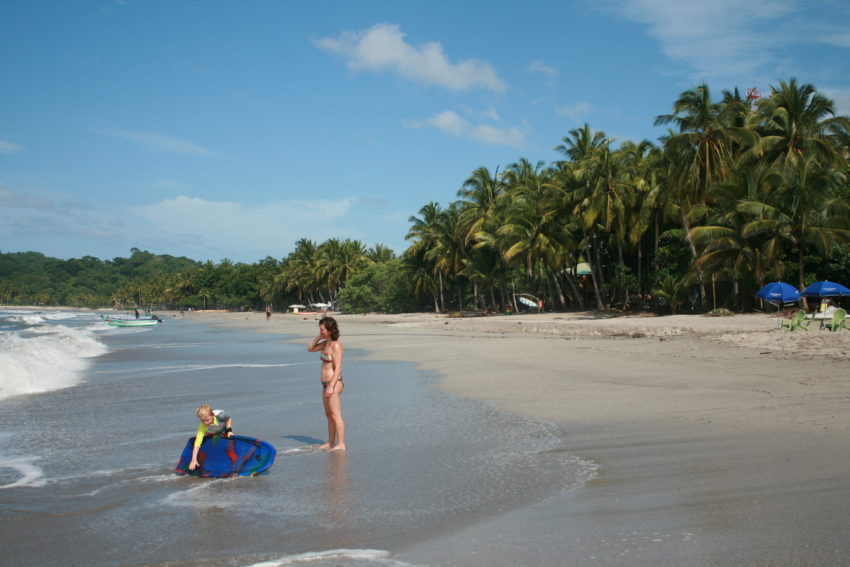Costa Rica Journal: Language school gives Samara a special bond with expats

Central America is a huge center for language schools and Samara seems to be one of the epicenters. Every non Tico I meet seems to be learning Spanish here. It’s a nice idea. You go to school for four hours a day and then use what you’ve learned on the beaches, bars and dusty streets of the village.
In Guatamala and Honduras I’ve known people who stay with families who don’t speak English. That’s ideal. The problem in Samara is the ones who put up students apparently barely have running water. The students all stay in hotels, apartments or, in one case, above one of the best restaurants in town, the Esmerelda.
Spanish is such a useful language. Since the U.S. has more Hispanics than any other minority, it seems natural that Americans can learn Spanish easily. I can turn on one of a half dozen radio stations in Denver and listen to Spanish all day.
People ask me why in the world I’d want to learn Italian when the only place you can speak it is in Italy.
“That’s not true,” I say. “I’m BIG in rural Libya.”
Seriously, no place in Latin America matches Italy in terms of food, pace, people. Even the beaches in Sardinia and Puglia can almost match those in Costa Rica. Just add a string of palm trees, surf, rice and beans.
The language schools seem to be the perfect buffer between Yanks and Ticos. It’s easy for locals to accept expats when they’re paying good money to indoctrinate themselves into their culture. I see a lot of white women with Ticos. Katie, who works at the surf school, is a former Montana State University golfer who came down for massage school and wound up staying. She’s been dating a Tico and, without taking a lesson, is fluent in Spanish.
Not all of Costa Rica is this peaceful. Expats have turned Costa Rica into one giant American suburb. I remember sitting in a bar in San Jose during a layover on my way to Nicaragua last year. An American said crime has gotten so bad in the capital that Americans have moved into these all-American suburbs. I say “All-American” only as a compound adjective. It’s like they want to live in a bubble and only come out when they want to take something of Costa Rica. The beach. A hooker. A bottle of rum. But don’t let anyone in. One expat living in Samara said she got a bottle thrown at her at an ATM. The guy yelled, “We don’t want you here!” ironically, in perfect English.
Also, I’ve read that Mexican drug lords discovered Costa Rica has no military. Why it took them this long makes me wonder how they could ever run a billion-dollar drug business. But they’re now using Costa Rica as a transportation hub between Colombia and the U.S. markets. Throw in some drug addiction with hostility toward white people and Costa Rica isn’t the little paradise it was advertised as in the ‘90s.
Then there are the Italians. Hundreds live here. After being here a few days and eating at some of the Italian restaurants, I now know why they left Italy. They can’t cook. I went back to Gusto Beach for dinner. I figured the Roman guy I met must have some authentic dishes.
I keep forgetting that you can’t get Italian ingredients anywhere but in Italy. In Denver I can’t repeat the same meals I made in Rome. The tomatoes aren’t as flavorful. They parmigiana doesn’t have the bite. The garlic isn’t as strong.
I had their pescado combination. The bruschetta was a limp piece of white bread with cold marinara sauce. It wasn’t even toasted. The fish was about an 8-ounce fillet with no seasonings exept a lime laying limply on top. With a mound of plain rice, the meal would’ve been tossed to the crabs by any Italian worth his spatula.
But I’ve got a great tan again. I laid on the near-empty beach in front of a palm tree. The beach here isn’t spotless. Just enough driftwood is scattered about to remind you you’re not in a five-star hotel. I finished my book, “The Only Game in Town,” a collection of sports essays through the decades in The New Yorker, a magazine my parents subscribed to their entire lives. It was about 90 degrees, not a cloud in the sky. Occasionally, a Tico would walk along the beach to his job as a surfing instructor or dishwasher. A couple would ride along on horses following a guide.
Every 15 minutes I’d dive into a sea that’s warmer than my swimming pool. Not a pebble scraped my feet. Not a boat was in sight. I looked back at Samara and saw a sleepy little Central American village in one of the most god-given corners on earth.
No language could describe this.

